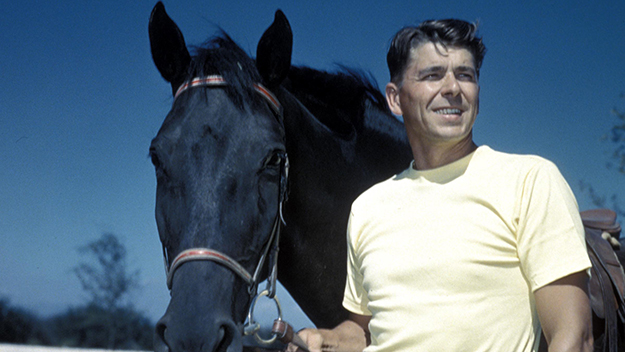News to Me: Ronald Reagan, Lucrecia Martel, and Kanopy’s Collapse

Ronald Reagan, 1955
1. If you pine for a time before celebrity Presidents and rampant Russophobia, too bad: J. Hoberman is in town and he’s celebrating the release of his long-awaited book, Make My Day: Movie Culture in the Age of Reagan. For the New York Review of Books, the critic penned this piece as something of an appetizer (“As much as he had been a movie actor, Reagan was a fan—a true believer in what he saw, or imagined, on the screen”). If that’s not enough, here’s an excerpt from Hoberman’s book, which we ran last fall.
2. Lucrecia Martel has been named chair of the jury for this year’s Venice International Film Festival (which begins in late August), and will be responsible for awarding the festival’s Golden Lion. Artistic director Alberto Barbera praised Martel as “Latin America’s most important female director, and one of the top worldwide.” For more Martel: check out this 2009 interview with BOMB, or Phoebe Chen’s recent piece for Another Gaze on The Headless Woman.
3. Édith Scob passed away recently. The French actress was most famous for her work in Eyes Without a Face (so much so that Leos Carax explicitly references her role in Holy Motors). Over at Criterion, David Hudson writes in memoriam, outlining Scob’s work with Franju, Ruiz, Rivette, Żuławski, Assayas, and more.
4. In more sad news, we bid farewell to Ben Barenholtz last week. The exhibitor/producer/director was a key figure in American independent cinema, pioneering the modern midnight movie and championing the works of David Lynch, John Waters, and the Coen Brothers. In his honor, IndieWire posted this piece on Barenholtz’s life (from surviving the Holocaust to directing his first feature at age 80), as well as this collection of remembrances.
5. The New York Public Library will no longer be granting free access to Kanopy (as of today!). Cardholders were notified of the news over the past week, with NYPL citing “unsustainable” costs. A few weeks back, we linked to this article from Film Quarterly, which breaks down just how unsustainable that pricing model was, with libraries paying per title rather than a flat subscription fee: “The figures I’ve seen are $150 for a year, $350 for a 3-year license, though the price might vary or change over time.”
6. The Japan Society will soon host its annual Festival of New Japanese Film, running July 19-28 (also known as Japan Cuts). Though the festival primarily focuses on contemporary works, it will this year feature a panel on the current state of film restoration in Japan, using a newly restored version of Kenji Mizoguchi’s Ugetsu as a case study.
7. Thanks to a recent article in The New York Times, film discourse has once again become obsessed with death: “How will the movies survive the next 10 years,” asks Kyle Buchanan, with various celebrity actors, directors, and producers chiming in. In an attempt to facilitate a less cynical response, IndieWire spoke to the likes of FC columnist Eric Hynes and FLC Director of Programming Dennis Lim, with the latter asking, “How many times are the movies supposed to have died by now?” (Consider too this excellent piece by James Schamus, published in Film Quarterly last year.)
8. The nonfiction moving-image festival, Sheffield Doc/Fest, recently celebrated its 26th year in a multitude of modes. Neelam Tailor surveys the many interactive, augmented, or virtual realities on display over at Frieze, including the National Film Board of Canada’s Clit Me: an interactive tablet game pushing back against the erasure of the female orgasm.
9. Last week, we reported on the upcoming 30th anniversary of Spike Lee’s Do the Right Thing, and the release of a brand new 35mm print to celebrate. Since then, a number of interesting pieces have popped up, including an interview by THR, a review of the new restoration by Ray Pride, and this Richard Brody article on the film’s enduring urgency: “Lee—in challenging the cultural segregation of Sal’s wall—challenges the very nature of a public space as private property. Here, too, Lee evokes the burden and the responsibility of history.” Above all, don’t miss Shonni Enelow’s moving feature on Ossie Davis and Ruby Dee in the new July/August issue of Film Comment.
10. “In English, ‘memento stella’ translates to ‘remember we are stars.’ It means that we are all living on one planet. It’s actually a prayer for peace. It’s too big a dream really, but I wanted to try.” Abstract filmmaker Takashi Makino recently sat down with Matt Turner at Mubi to discuss his new film, Memento Stella. For more, read our interview from 2004 wherein Makino describes his attempt “to reach the limits of abstraction, which is naturally an endless endeavor.”
We leave you this week with a small taste of the filmmaker’s work, featuring snippets from EVE, On Generation and Corruption (with music by Jim O’Rourke), and the aforementioned Memento Stella:







